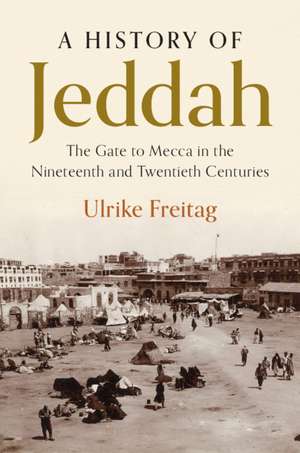A History of Jeddah: The Gate to Mecca in the Nineteenth and Twentieth Centuries
Autor Ulrike Freitagen Limba Engleză Hardback – 18 mar 2020
| Toate formatele și edițiile | Preț | Express |
|---|---|---|
| Paperback (1) | 310.51 lei 6-8 săpt. | |
| Cambridge University Press – 9 noi 2022 | 310.51 lei 6-8 săpt. | |
| Hardback (1) | 380.95 lei 6-8 săpt. | |
| Cambridge University Press – 18 mar 2020 | 380.95 lei 6-8 săpt. |
Preț: 380.95 lei
Nou
Puncte Express: 571
Preț estimativ în valută:
72.90€ • 79.16$ • 61.24£
72.90€ • 79.16$ • 61.24£
Carte tipărită la comandă
Livrare economică 22 aprilie-06 mai
Preluare comenzi: 021 569.72.76
Specificații
ISBN-13: 9781108478793
ISBN-10: 1108478794
Pagini: 404
Dimensiuni: 168 x 235 x 22 mm
Greutate: 0.73 kg
Editura: Cambridge University Press
Colecția Cambridge University Press
Locul publicării:Cambridge, United Kingdom
ISBN-10: 1108478794
Pagini: 404
Dimensiuni: 168 x 235 x 22 mm
Greutate: 0.73 kg
Editura: Cambridge University Press
Colecția Cambridge University Press
Locul publicării:Cambridge, United Kingdom
Cuprins
1. Introduction: why Jeddah?; 2. Between sea and land: Jeddah through the ages; 3. The changing faces of Jeddah; 4. The changing urban space of Jeddah; 5. Solidarity and competition: the socio-cultural foundations of life in Jeddah; 6. The economic lifelines of Jeddah: trade and pilgrimage; 7. Governing and regulating diversity: urban government in Jeddah; 8. The disappearance and return of old Jeddah: on the temporality of translocal relations.
Recenzii
'A painstakingly researched urban history of conviviality, mobility and diversity. Freitag brings to life the true power of place through a granular, deeply felt and skilfully executed study of Jeddah's peoples, spaces and institutions over one hundred years or so of the city's more recent history.' Nelida Fuccaro, New York University, Abu Dhabi
'Drawing on a wealth of sources in many languages, Freitag's textured and compelling analysis succeeds brilliantly at showing Jeddah's unique position in a rapidly changing, interconnected world that spanned the Ottoman Empire, the Middle East, and the Indian Ocean region from the mid-nineteenth through the mid-twentieth centuries. A must read.' Thomas Kuehn, Simon Fraser University
'Drawing on a dazzling array of sources in Arabic and other languages, this rich and brilliantly researched book offers a conceptually sophisticated history of a major Arabian port and the 'Gate to Mecca.' Dynamically interweaving the global, regional and the local, and with a nuanced sensitivity to insider and commoner dimensions, Freitag makes a phenomenal contribution to the study of urban cosmopolitanisms in the Red Sea and Indian Ocean worlds.' Jonathan Miran, Western Washington University
'An in-depth and lively history of Jeddah. With her command of both local and foreign literature and the use of an astonishing documentation, Ulrike Freitag make us dive into the history of Mecca's 'entrance' up to the present, and into the connecting point of the Red Sea and the Indian Ocean.' Philippe Pétriat, Panthéon-Sorbonne University
'Drawing on a wealth of sources in many languages, Freitag's textured and compelling analysis succeeds brilliantly at showing Jeddah's unique position in a rapidly changing, interconnected world that spanned the Ottoman Empire, the Middle East, and the Indian Ocean region from the mid-nineteenth through the mid-twentieth centuries. A must read.' Thomas Kuehn, Simon Fraser University
'Drawing on a dazzling array of sources in Arabic and other languages, this rich and brilliantly researched book offers a conceptually sophisticated history of a major Arabian port and the 'Gate to Mecca.' Dynamically interweaving the global, regional and the local, and with a nuanced sensitivity to insider and commoner dimensions, Freitag makes a phenomenal contribution to the study of urban cosmopolitanisms in the Red Sea and Indian Ocean worlds.' Jonathan Miran, Western Washington University
'An in-depth and lively history of Jeddah. With her command of both local and foreign literature and the use of an astonishing documentation, Ulrike Freitag make us dive into the history of Mecca's 'entrance' up to the present, and into the connecting point of the Red Sea and the Indian Ocean.' Philippe Pétriat, Panthéon-Sorbonne University
Notă biografică
Descriere
An urban history of Jeddah from the late Ottoman period to the present day, seen through its diverse and changing population.
